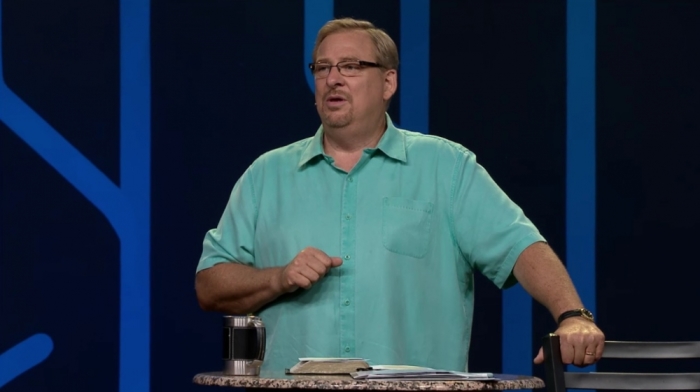Rick Warren: COVID-19 has 'revealed a fundamental weakness in the Church'

Many churches across the U.S. are scrambling in the wake of COVID-19 because they’ve focused solely on worship instead of other aspects of ministry, Pastor Rick Warren of the California-based Saddleback Church has said.
“COVID revealed a fundamental weakness in the Church,” the pastor recently told Relevant magazine in an interview. “Most churches only have one purpose: worship. And if you take worship away, you’ve got nothing. They’re in a hurry to get back to worship because that’s all they’ve got.”
But the 20,000-member Saddleback Church is built not on one purpose, but on five,” Warren explained.
“You take one circle out, we’ve still got four other circles. We’ve got ministry going on. We’ve got mission going on. We’ve got fellowship going on. We’ve got discipleship going on. Those all stand on their own.”
As a result, removing worship didn’t shut the church down, The Purpose Driven Life author contended. In fact, Saddleback's seen over 16,000 people come to Christ since March — and is continuing to see about 80 new conversions a day.
“We’re in revival,” he said.
When the pandemic first hit, Saddleback’s leadership “looked around and made a list of all the different problems that COVID was creating,” and then met those needs.
“For instance, the first one was food,” Warren said, adding that Saddleback partnered with every school district in Orange County to develop “food pantry pop-ups.” Now, the church is the largest food distributor in Southern California,” having served over 3.5 million pounds of food to over 300,000 families.
“We teach our people that every member of the church is a minister,” Warren said. “Everybody’s a missionary too. You’re a witness. Those people already know how to share their faith. When people would pull up they’d talk to them about the Lord.”
“Of those 16,000 people who have come to Christ, over 12,000 of them have come through personal, one-on-one witnessing by my members. Not led to Christ by my sermons. By one-on-one evangelizing.”
Though California's strict limits on church attendance during the pandemic have angered churches across the state, Warren stressed that he doesn’t believe places of worship are being discriminated against.
“They might have a discrimination case if theaters weren’t closed, football games weren’t closed ... But they are,” he added. “We’re not being discriminated against. This is a safety issue. Regal Cinemas closed down 650 theaters. Disney laid off 28,000 people. We’re not being discriminated against.”
Suggesting that “some churches are willing to gamble the health of their people,” Warren said he is not.
“The good shepherd prays for his sheep, cares for his sheep. One day I will be responsible. I don’t want to be a super-spreader. I’m not doing this out of fear; I’m doing this out of love. You wear a mask for love your neighbors, yourself.”
Researcher Warren Bird, president of the Evangelical Council for Financial Accountability, previously told The Christian Post that as the COVID-19 pandemic fades away, the churches that “do small groups well” will most likely be “stronger” than those that do not.
"In light of the pandemic, so much of church health today depends on a vibrant, small group system underneath the big gatherings, whether they're in person or online," he said.
“Much like in the pandemic, the churches that are most threatened are those with preexisting health conditions,” Bird explained. “The churches that are going to have the hardest time re-surfacing will be ones that depended solely on the Sunday morning gathering. They will have a hard time re-gathering, rebuilding momentum, and reestablishing their mission as a church.”
As many as one in five churches could permanently close due to shutdowns stemming from the pandemic, David Kinnaman, president of the prominent Christian research organization Barna Group, recently said.
As time passes, Kinnaman said that “we’ll look back at this pandemic as a fundamental change to the way Americans” handled church attendance.
Exponential CEO Todd Wilson recently said that “what is church” is “going to become “one of the key questions coming out of COVID,” as the digital way many are currently worshiping is “more of a missionary impulse for evangelism.”
“Personally, I'm predicting it's going to become more of a debate, not less, as we move into the future,” he said. “It seems like the new normal is going to involve greater digital than pre-COVID. ... All of a sudden, churches are going to think about, ‘Why do I even have a physical building? Why do I need it? Why not be completely digital?’”
“At some point, we've got to go through that question of, ‘What, physically, is church?”





























